L61-肯定或否定句式 初中英语词性句法新讲课件
文档属性
| 名称 | L61-肯定或否定句式 初中英语词性句法新讲课件 | 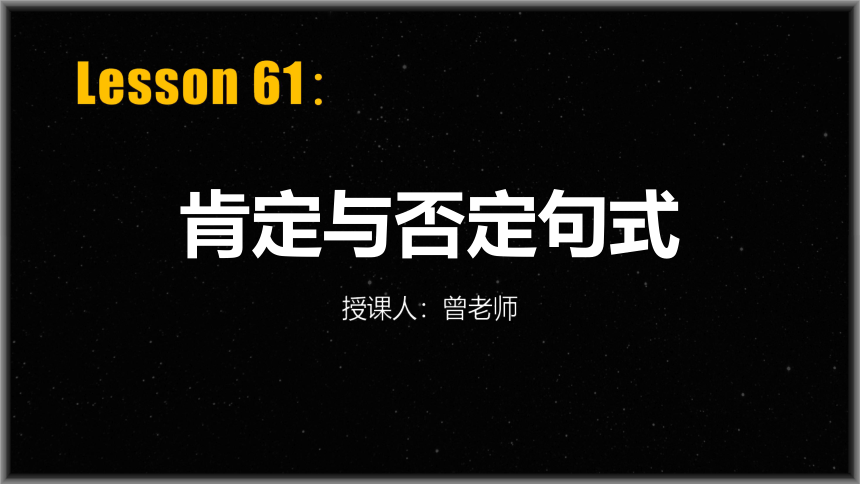 | |
| 格式 | ppt | ||
| 文件大小 | 907.0KB | ||
| 资源类型 | 试卷 | ||
| 版本资源 | 通用版 | ||
| 科目 | 英语 | ||
| 更新时间 | 2022-04-09 19:12:22 | ||
图片预览

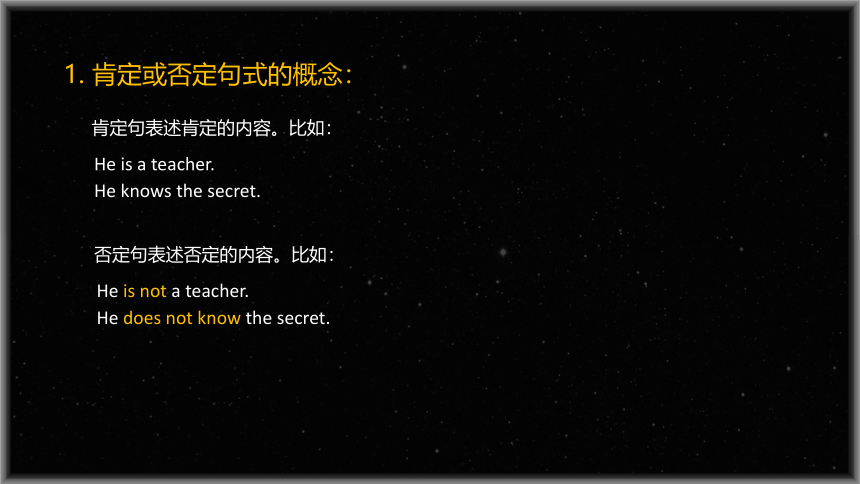
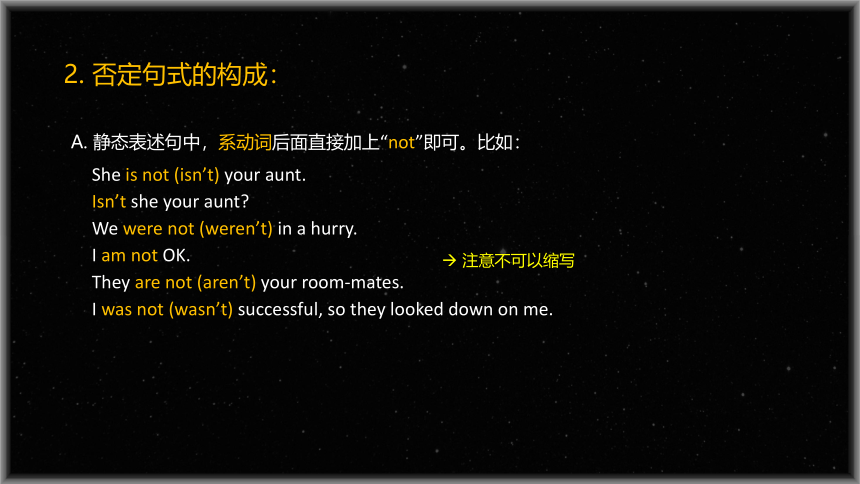
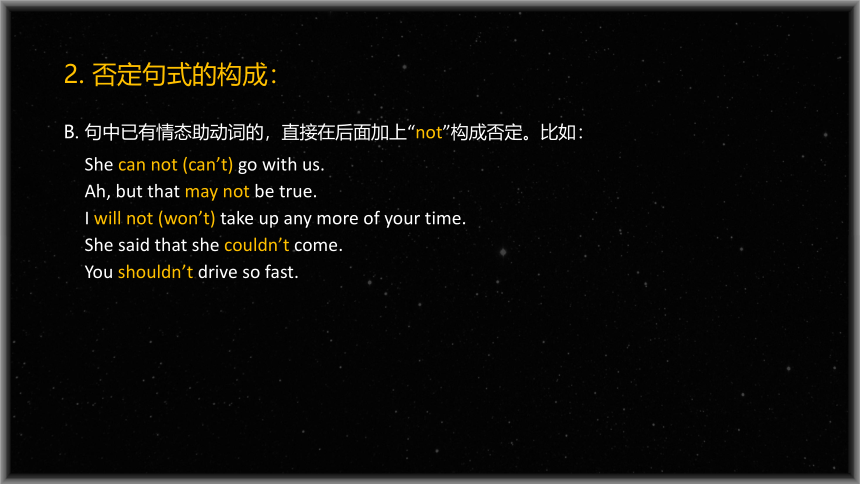
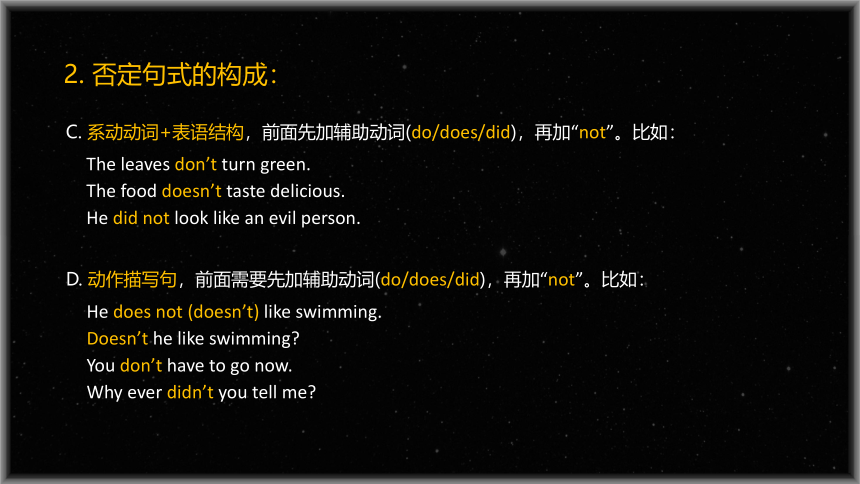
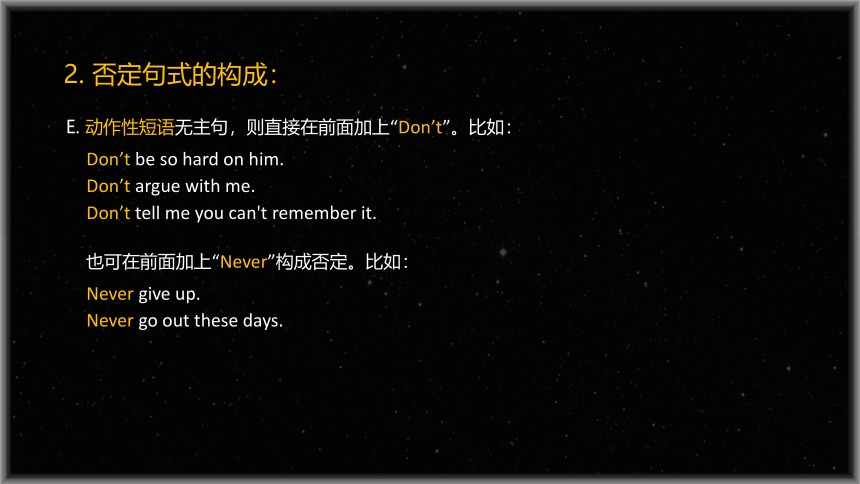
文档简介
(共12张PPT)
肯定与否定句式
Lesson 61:
授课人:曾老师
1. 肯定或否定句式的概念:
肯定句表述肯定的内容。比如:
He is a teacher.
He knows the secret.
否定句表述否定的内容。比如:
He is not a teacher.
He does not know the secret.
2. 否定句式的构成:
A. 静态表述句中,系动词后面直接加上“not”即可。比如:
She is not (isn’t) your aunt.
Isn’t she your aunt
We were not (weren’t) in a hurry.
I am not OK.
They are not (aren’t) your room-mates.
I was not (wasn’t) successful, so they looked down on me.
注意不可以缩写
2. 否定句式的构成:
B. 句中已有情态助动词的,直接在后面加上“not”构成否定。比如:
She can not (can’t) go with us.
Ah, but that may not be true.
I will not (won’t) take up any more of your time.
She said that she couldn’t come.
You shouldn’t drive so fast.
2. 否定句式的构成:
C. 系动动词+表语结构,前面先加辅助动词(do/does/did),再加“not”。比如:
The leaves don’t turn green.
The food doesn’t taste delicious.
He did not look like an evil person.
D. 动作描写句,前面需要先加辅助动词(do/does/did),再加“not”。比如:
He does not (doesn’t) like swimming.
Doesn’t he like swimming
You don’t have to go now.
Why ever didn’t you tell me
2. 否定句式的构成:
E. 动作性短语无主句,则直接在前面加上“Don’t”。比如:
Don’t be so hard on him.
Don’t argue with me.
Don’t tell me you can't remember it.
Never give up.
Never go out these days.
也可在前面加上“Never”构成否定。比如:
2. 否定句式的构成:
F. 其它否定词构成的否定。比如:
They seldom come late.
You never help me.
We hardly know each other.
Neither of us felt like going out.
No pocket money is with each of them.
Very few students learn Latin now.
Nothing is wrong with us.
Nobody realizes how bad things are.
There is so little time left that I have to leave at once.
3. 特殊否定情况:
They have not (haven’t) seen such an animal.
She hasn’t got much free time.
1). “have”的否定形式:
“have”作为助动词,只有一种否定形式。比如:
She hasn’t much free time. 或:She hasn’t got much free time.
或: She doesn’t have much free time.
“have”作为动作动词,则有二种否定形式。比如:
3. 特殊否定情况:
▲ 2).“need”与“dare”的二种否定形式。比如:
情态助动词情况下:He daren’t say what he thought.
实义动作词情况下: He didn’t dare to say what he thought.
情态助动词情况下:You needn’t worry about the children.
实义动作词情况下: You don’t need to worry about the children.
▲特别注意1:
如果谓语动词本身就是“do/does/did”,千万不要漏掉它。比如:
He does not do his homework at home.
Does he do well in English
She didn’t do a full day's work.
4. 否定句注意事项:
▲特别注意2:
情态助动词“must”的否定形式不是“mustn’t”,而是“needn’t”或“don’t have to”。
比如:
A: Must I turn in the paper in three days
B: No, you needn’t.
A: Must they get up now
B: No, they don’t have to.
4. 否定句注意事项:
▲特别注意3:
“used to”的否定形式是“didn’t use to”。比如:
I used to like him much when we were at school.
I didn’t use to like him much when we were at school.
4. 否定句注意事项:
肯定与否定句式
Lesson 61:
授课人:曾老师
1. 肯定或否定句式的概念:
肯定句表述肯定的内容。比如:
He is a teacher.
He knows the secret.
否定句表述否定的内容。比如:
He is not a teacher.
He does not know the secret.
2. 否定句式的构成:
A. 静态表述句中,系动词后面直接加上“not”即可。比如:
She is not (isn’t) your aunt.
Isn’t she your aunt
We were not (weren’t) in a hurry.
I am not OK.
They are not (aren’t) your room-mates.
I was not (wasn’t) successful, so they looked down on me.
注意不可以缩写
2. 否定句式的构成:
B. 句中已有情态助动词的,直接在后面加上“not”构成否定。比如:
She can not (can’t) go with us.
Ah, but that may not be true.
I will not (won’t) take up any more of your time.
She said that she couldn’t come.
You shouldn’t drive so fast.
2. 否定句式的构成:
C. 系动动词+表语结构,前面先加辅助动词(do/does/did),再加“not”。比如:
The leaves don’t turn green.
The food doesn’t taste delicious.
He did not look like an evil person.
D. 动作描写句,前面需要先加辅助动词(do/does/did),再加“not”。比如:
He does not (doesn’t) like swimming.
Doesn’t he like swimming
You don’t have to go now.
Why ever didn’t you tell me
2. 否定句式的构成:
E. 动作性短语无主句,则直接在前面加上“Don’t”。比如:
Don’t be so hard on him.
Don’t argue with me.
Don’t tell me you can't remember it.
Never give up.
Never go out these days.
也可在前面加上“Never”构成否定。比如:
2. 否定句式的构成:
F. 其它否定词构成的否定。比如:
They seldom come late.
You never help me.
We hardly know each other.
Neither of us felt like going out.
No pocket money is with each of them.
Very few students learn Latin now.
Nothing is wrong with us.
Nobody realizes how bad things are.
There is so little time left that I have to leave at once.
3. 特殊否定情况:
They have not (haven’t) seen such an animal.
She hasn’t got much free time.
1). “have”的否定形式:
“have”作为助动词,只有一种否定形式。比如:
She hasn’t much free time. 或:She hasn’t got much free time.
或: She doesn’t have much free time.
“have”作为动作动词,则有二种否定形式。比如:
3. 特殊否定情况:
▲ 2).“need”与“dare”的二种否定形式。比如:
情态助动词情况下:He daren’t say what he thought.
实义动作词情况下: He didn’t dare to say what he thought.
情态助动词情况下:You needn’t worry about the children.
实义动作词情况下: You don’t need to worry about the children.
▲特别注意1:
如果谓语动词本身就是“do/does/did”,千万不要漏掉它。比如:
He does not do his homework at home.
Does he do well in English
She didn’t do a full day's work.
4. 否定句注意事项:
▲特别注意2:
情态助动词“must”的否定形式不是“mustn’t”,而是“needn’t”或“don’t have to”。
比如:
A: Must I turn in the paper in three days
B: No, you needn’t.
A: Must they get up now
B: No, they don’t have to.
4. 否定句注意事项:
▲特别注意3:
“used to”的否定形式是“didn’t use to”。比如:
I used to like him much when we were at school.
I didn’t use to like him much when we were at school.
4. 否定句注意事项:
同课章节目录
- 词法
- 名词
- 动词和动词短语
- 动词语态
- 动词时态
- 助动词和情态动词
- 非谓语动词
- 冠词
- 代词
- 数词和量词
- 形容词副词及其比较等级
- 介词和介词短语
- 连词和感叹词
- 构词法
- 相似、相近词比较
- 句法
- 陈述句
- 一般疑问句和否定疑问句
- 特殊疑问句及选择疑问句
- 反意疑问句
- 存在句(There be句型)
- 宾语从句
- 定语从句
- 状语从句
- 主谓一致问题
- 简单句
- 并列句
- 复合句
- 主谓一致
- 主、表语从句
- 名词性从句
- 直接引语和间接引语
- 虚拟语气
- 感叹句
- 强调句
- 倒装句
- 祈使句
- 句子的成分
- 句子的分类
- 题型专区
- 单项选择部分
- 易错题
- 完形填空
- 阅读理解
- 词汇练习
- 听说训练
- 句型转换
- 补全对话
- 短文改错
- 翻译
- 书面表达
- 任务型阅读
- 语法填空
- 其他资料
